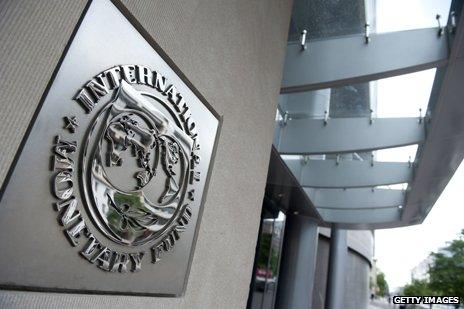IMF: 'Ward off housing bubble now'
- Published
- comments

It was just over a year ago that the IMF's chief economist, Olivier Blanchard, warned George Osborne that he was "playing with fire" if he did not ease off on his austerity policy, because economic recovery in the UK seemed so elusive.
Just a few days later, Mr Blanchard's criticism of the cuts implemented by the chancellor was more gently repeated by Christine Lagarde, the IMF's head: "We have said that should growth abate, should growth be particularly low, then there should be consideration to adjusting by way of slowing the pace [of austerity]."
We now know that the IMF's timing was about as wrong as it could be, because the UK economy was on the turn - and a rapid recovery was about to take hold.
Even so, in today's IMF's report on prospects for the UK economy, the so-called Article lV consultation, there isn't a trace of humble pie, or any expressed regrets for last year's erroneous evaluation of what was happening under the bonnet of the UK economy.
In fact, the IMF might be vulnerable to the charge that it is being a touch disingenuous, by saying today that "the government has shown welcome flexibility in its fiscal [tax and spend] programme".
All that aside, if the IMF's report can be seen as the equivalent of an MOT, Britain's motor doesn't seem in too bad shape:
"The economy has rebounded strongly and growth is becoming more balanced," the IMF says. "Growth has accelerated since the second half of 2013, and leading indicators suggest that the recovery has momentum."
Most of the rest of what the IMF says is thoroughly predictable, and is broadly in line with what the Bank of England, the Office for Budget Responsibility and conventional City forecasters have been saying.
Thus household spending spurred the recovery. Business investment is now picking up, although it is too early to judge whether this rebound will be strong enough or durable enough. And the trade deficit remains disappointing.
There are two flaws in the recovery, identified by the IMF, which could cause the engine to stutter - although neither of them will come as any surprise to you.
The first is that productivity growth remains incredibly tepid. And unless it picks up, "growth will eventually stall" according to the IMF, once the economy is running at full capacity again (not however that anyone has much of a clue what "full capacity" might be, or when it might be hit).
And another thing - boosting the amount that businesses produce, relative to the efforts of their people, really matters - because, apart from anything else, doing so allows companies to increase wages above the rate of inflation, without putting their prices up.

No prizes for guessing the IMF's second warning. Here it is: "House price inflation is particularly high in London, and is becoming more widespread."
Really? Who knew?
That said, the IMF position is that this is an accident that may happen, not one that has happened already. It says: "So far, there are few of the typical signs of a credit-led bubble."
But it is concerned that bigger and bigger mortgages are being taken out, relative to borrowers' incomes, which means that "households are gradually becoming more vulnerable to income and interest rate shocks".
Or to put it another way, if too many people take out fat mortgages in this era of record low interest rates, then at some future point when interest rates rise, or as and when these people lose their jobs, they will have difficulty keeping up the payments, lending banks will incur painful losses, and there could be a bit of a blow to the economy.
So what is to be done about the incipient housing and mortgage bubble?
Well, the IMF believes this is the moment for the new Financial Policy Committee of the Bank of England - which has a range of tools to ward off financial instability - to do its stuff.
In the first instance, it wants limits imposed on the proportion of high loan-to-income mortgages that any lender can make. Or to put it another way, there would be rationing of mortgages for those whose incomes are small, relative to what they need to borrow to buy a house. Those shut out of the market would include a disproportionate number of first time buyers.
And if that were not to take the heat out of the housing market, then there may need to be a formal cap on the multiple of any household's income that the household could borrow from a bank for house purchase.
Also, banks may have to be forced to set aside capital to absorb future potential losses from mortgages that go bad, the IMF says.
When should such evasive action be taken?
Well, the IMF would like these preventative measures introduced "early and gradually" - which presumably means at the FPC's next meeting, which happens to be this month.
As for Help to Buy, the government's subsidised loans scheme for those who cannot afford to put down a big deposit on a house, the IMF agrees that is it "enabling creditworthy lower-income households to purchase homes, especially outside London and the South East".
But it says that the Treasury and Financial Policy Committee "may wish to consider whether Help to Buy should be modified or even remains necessary for the full three years", if mortgage availability for low-income borrowers and first-time buyers continues to improve, or if it looks as though the subsidised scheme is "contributing to financial risks".
What is the big thing that needs to be done, according to the IMF, to make the UK economy less vulnerable to boom and bust in the housing market?
Again, no cigar for guessing.
The IMF, like almost every analyst, wants more houses to be built - by removing "unnecessary constraints on brownfield and greenfield developments", by changing "tax policies that discourage the most economically efficient use of property" and by reforming the rental market.